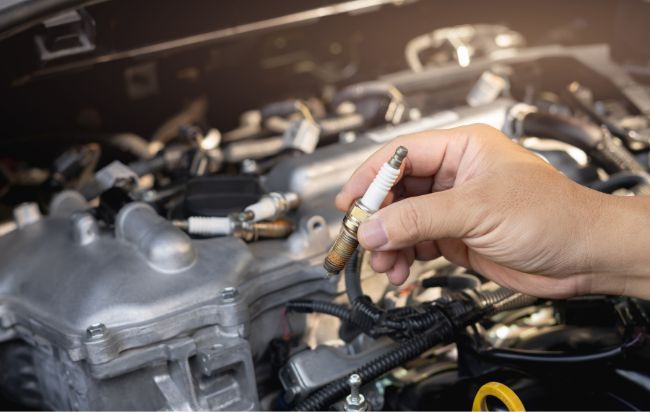
What Are Spark Plugs?
Spark plugs provide the “strike” that ignites the gas and fuel mixture passing through the engine. As they are connected to the battery, damage or wear can interrupt this pathway or prevent it from completion.
A typical car engine has the same number of spark plugs as cylinders. As such, most passenger vehicles contain four spark plugs. Precision-oriented vehicles may include two spark plugs per cylinder.
Facilitating the ignition process is a combination of metals, including nickel, copper and platinum, plus some kind of insulation – ceramic is a common option. Within this design is a path between a center and ground electrode. Igniting the spark plug results in a small explosion that forces the piston along the cylinder. Prior to this action, the piston captures the air-fuel mixture within each cylinder and the car’s ignition coil generates a pulse that activates each spark plug.
When to Replace Spark Plugs
Based on your car’s make and model, spark plugs can have a lengthy lifespan with about 800,000 miles being the average. A technician may check them during a tune-up or regularly scheduled maintenance.
Lifespan can further depend on the type of spark plug inside your vehicle. A conventional spark plug lasts 30,000 to 50,000 miles, while a longer-life model lasts anywhere from 60,000 to 150,000 miles. You’re advised to check your vehicle’s maintenance schedule for the manufacturer’s recommendations.
If you reach this point – or the spark plugs start to indicate wear or damage – you need to get them replaced as soon as possible. Otherwise, your engine can experience ignition coil failure, resulting in more damage that will have to be repaired.
Signs of Spark Plug Damage
- The check engine light comes on, often as a result of the engine misfiring or rough idling.
- Your car experiences challenges starting up, often stalling when you try to turn it on.
- Your car seems to require more gas, resulting in decreased miles per gallon and more emissions.
- The engine seems to make a rattling or rumbling sound whenever your car idles.
- The car takes longer to accelerate or doesn’t seem as responsive when you press the gas.
Inspecting and Replacing Spark Plugs
Should you notice any of the above warning signs, you’re advised to take your car in for an inspection. The service appointment may uncover:
- Deposits, including carbon or oil on the spark plug, which can indicate a decrease in performance and overall issue with the combustion process.
- A problem with the cylinder preventing the spark plug from performing optimally, including overheating or an insufficient air-fuel mixture.
- The reason why your car fails to fully start, which might involve a combination of the battery, spark plugs and engine.
If the issue can be traced back to spark plug damage alone, your technician will recommend having them replaced as a set, along with any connected wires. Yet based on the combustion process, the battery, alternator or cylinders may also need repairs.
If your car is having a hard time starting up, make an appointment with DaSilva’s Auto Body to have the spark plugs inspected and repaired or replaced. To learn more, contact us today.

